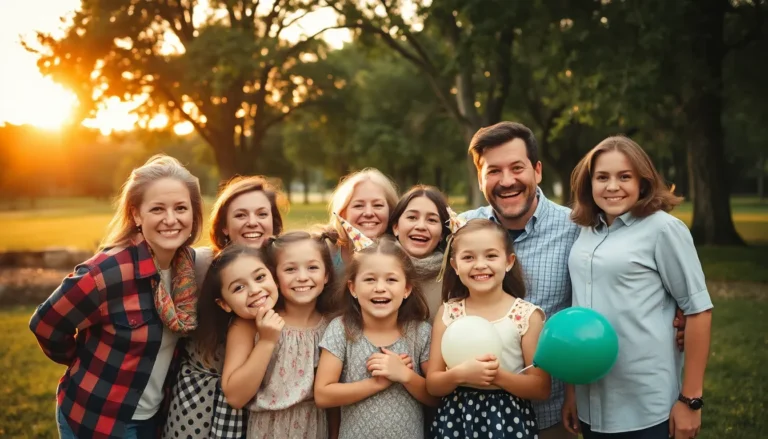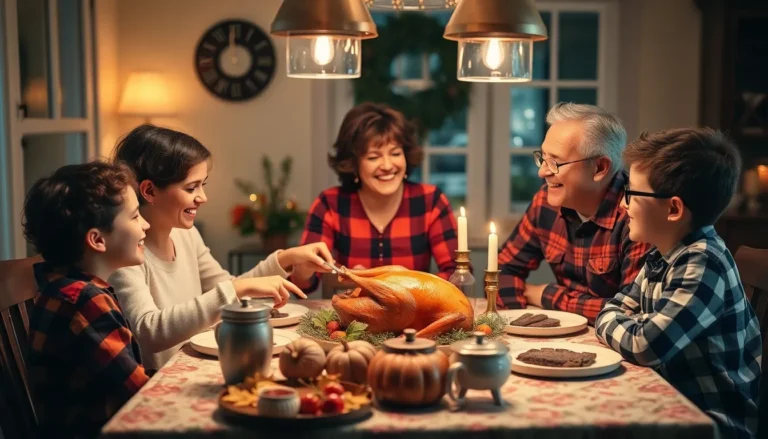Table of Contents
ToggleGermany is a land rich in culture and family traditions that’ll make you want to pack your bags and join the fun. From lively Oktoberfest celebrations to cozy Christmas markets, these customs are more than just events—they’re heartwarming moments that bring families together. Picture this: the aroma of freshly baked pretzels wafting through the air while laughter fills the room. It’s a scene that captures the essence of German family life.
Overview of German Family Traditions
German family traditions reflect deep-rooted customs that enhance bonds among family members. Celebrations centered around significant holidays often serve as focal points for gatherings. For instance, Christmas brings families together, highlighting activities such as decorating trees and exchanging gifts.
Incorporating regional customs adds variety to traditions. Oktoberfest showcases not only beer and food but also opportunities for families to unite in celebration. Attending fairs and participating in traditional dances fosters a sense of community.
Festivities evolve with family dynamics, maintaining relevance across generations. Birthdays hold special significance, with milestones marked by unique customs such as cake decoration and games. Families take part in special rituals like singing songs or reciting blessings, reflecting personal and cultural heritage.
Education plays an important role in shaping family traditions. Parents emphasize values such as respect and teamwork through collaborative activities, including cooking and gardening. These shared experiences cultivate lasting memories for children.
Seasonal traditions enhance the annual rhythm of family life. In spring, for example, families partake in Easter festivities by decorating eggs and hiding them for children to find. Autumn features traditions like harvesting and preparing preserves for winter.
Daily family life incorporates rituals that strengthen bonds. Mealtimes serve as crucial moments for connection, promoting conversation and sharing experiences. Regular family walks or game nights build camaraderie and foster relationships.
Overall, German family traditions encompass a rich tapestry of customs that enhance relationships and promote a sense of belonging. Each celebration, whether seasonal or personal, contributes to the vibrant cultural identity that families cherish.
Important Traditions in German Families
German families cherish their traditions, especially during holidays and gatherings, which foster a sense of unity and belonging.
Celebrating Holidays
Holidays in Germany involve numerous customs that enrich family life. Families gather for Christmas celebrations that include beautifully decorated trees and shared meals. They often bake traditional cookies together, creating a warm, festive atmosphere. Easter brings activities such as egg decorating and egg hunts, fostering creativity among children. Finally, during Oktoberfest, families participate in parades and enjoy traditional foods, emphasizing community spirit and togetherness.
Family Gatherings
Family gatherings serve as essential moments in German culture. Regular Sunday meals often become a tradition, where families share stories and enjoy home-cooked meals. Celebrating birthdays also holds special significance, with unique rituals like singing traditional songs and enjoying cake. In addition, family reunions bring together extended relatives, strengthening bonds across generations. These gatherings not only provide opportunities for connection but also pass down family history and customs, solidifying family identity.
The Role of Food in Family Traditions
Food plays a central role in German family traditions, acting as a unifying factor during gatherings and celebrations.
Traditional German Dishes
German cuisine features a variety of traditional dishes that define family meals. Sauerbraten, a pot roast, often takes center stage during special occasions. Sausages, like Bratwurst and Weisswurst, become staples at family barbecues. Potato salad and red cabbage add vibrant flavors to holiday dinners. Desserts such as Black Forest cake and Stollen celebrate festive moments. Each region presents unique specialties, enriching the family dining experience and highlighting local culinary traditions.
Family Recipes and Cooking Together
Family recipes often pass down through generations, creating bonds and memories. Cooking together fosters collaboration and teamwork among family members. Popular activities include making Spätzle, a German egg noodle, or baking Lebkuchen, traditional gingerbread cookies for Christmas. Grandparents frequently share their culinary secrets, enhancing connections with younger generations. Cooking sessions often lead to stories about heritage, reinforcing cultural identity. These shared experiences strengthen the family unit, making each meal not just sustenance but also a celebration of togetherness.
Regional Variations in Family Traditions
German family traditions vary significantly across different regions. These regional customs enhance local identities and bring unique flavors to family life.
Northern Germany
Northern Germany celebrates its traditions with distinctive maritime influences. Families in coastal areas often observe rituals linked to the sea, such as the Krabbenpulen, or shrimp peeling, which brings communities together during summer gatherings. Fishermen’s festivals showcase local cuisine, emphasizing fresh catches like herring and smoked fish. Birthdays here may feature white cake, symbolizing purity and joy, while traditional games enliven family celebrations, engaging children and adults alike. The spirit of unity shines through in these gatherings, reinforcing family connections and cultural heritage.
Southern Germany
Southern Germany embraces a vibrant tapestry of traditions rich in folklore and festivity. Families partake in Fasching, the pre-Lenten carnival, where colorful costumes and lively parades create a festive atmosphere. Traditional dishes like Weisswurst and Brezen, enjoyed during gatherings, reflect regional culinary specialties. Easter celebrations often involve elaborate egg decorating, a cherished activity that highlights creativity, especially among children. In the fields, harvest festivals showcase regional produce and foster community spirit, allowing families to bond while celebrating agricultural traditions. This regional focus on togetherness adds depth to family relationships and uplifts the shared cultural identity.
Modern Changes to Traditional Practices
Shifts in society influence German family traditions, altering how families celebrate significant events. Modern technology introduces new ways to connect during holidays. Virtual gatherings and online shopping offer convenience, allowing families to share moments even when physically apart.
Changes also appear in holiday customs. Traditional celebrations now incorporate contemporary elements, such as themed decorations and diverse cuisines reflecting multicultural influences. Different families infuse their heritage into well-known meals, broadening the culinary landscape.
Youth involvement in shaping traditions increases. Children often share ideas for new activities, transforming centuries-old customs into vibrant experiences. Innovative games and fresh takes on traditional recipes frequently emerge, making celebrations more engaging for younger generations.
Community influence plays a role in these shifts. Neighborhood festivals and events integrate various cultural backgrounds, making family gatherings more inclusive. The blending of traditions enriches the experience, as families incorporate aspects from different cultures into their celebrations.
Additionally, sustainability becomes a priority. Families seek eco-friendly options for decorations and gifts, emphasizing mindfulness in festivities. This trend reinforces values that align with a modern consciousness while still honoring historic practices.
Respecting traditions alongside embracing progress reflects how German families adapt. While significant customs persist, the flexible nature of these traditions ensures they remain relevant, appealing to both older and younger family members. Balancing nostalgia with innovation strengthens family ties, keeping the spirit of togetherness alive amid change.
German family traditions are a vibrant tapestry woven from history, culture, and shared experiences. They foster connections among family members and create lasting memories during celebrations. Whether it’s the warmth of Christmas gatherings or the lively spirit of Oktoberfest, these customs reflect a commitment to togetherness.
As families adapt to modern influences, they continue to honor their heritage while embracing new practices. This evolution ensures that traditions remain relevant and meaningful for future generations. The essence of German family life lies in these cherished moments, where food, laughter, and love unite families across time and space.







